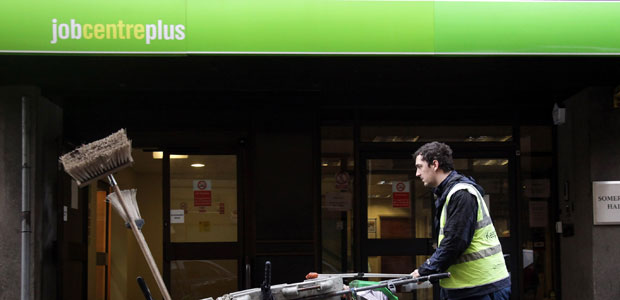Welfare-to-work: how the scheme works
With the government’s welfare-to-work programme in the spotlight, Channel 4 News looks at the schemes on offer for the unemployed.

The part of the programme that has attracted most attention recently is the work experience scheme for young people who are unemployed.
Critics claim these people are being forced to work for nothing or lose their benefits, and some of the companies involved are having second thoughts because they do not want to be accused of using “slave labour”.
Employment Minister Chris Grayling told the BBC Today programme on Friday that “a small number of activists” were trying to “destabilise” the firms.
Another major part of welfare-to-work is the work programme for the long-term unemployed. One of the so-called “prime providers” of the scheme is A4E, whose boss Emma Harrison resigned as the government’s “family champion” on Thursday after it was revealed that the DWP had begun inquiries into alleged fraud at the company.
Work experience
The work experience scheme is part of the government’s £1bn youth contract to help 16- to 24-year-olds, a million of whom are jobless, to find work.
The contract has various elements. Under the work experience scheme, which is voluntary, young people are placed with an employer for between two and eight weeks.
They receive benefits during this placement, but risk losing their jobseeker’s allowance for a period of time if they fail to show up after their first week.
The British Retail Consortium defends the government's objective of helping unemployed people find work. "It's absolutely right to be trying to get people back into the world of work and attract them to the world of work for the first time," said spokesman Richard Dodd.
"When it comes to the details, individual retailers will make their own judgments about the extent to which they are able to support them or become involved in a particular scheme."
Of the three million people employed in retail in the UK, one million are under 25, and Mr Dodd said this sector had a vital role in offering opportunities to those who had been out of work for some time or needed to work flexibly.

“Slave labour” claims were made after a job advert for Tesco was wrongly posted on the Jobcentre Plus website, offering benefits and expenses for night shift work at a supermarket in East Anglia.
The company said a mistake had been made, announcing on Tuesday that young people would be offered a choice in future: taking part in the government’s scheme or carrying out a four-week paid placement with a job guarantee at the end if they completed their probation period “satisfactorily”. It advised the government to scrap its threat to withdraw benefits.
On Thursday, Poundland said it was pulling out of the scheme after 22-year-old Cait Reilly, who spent three weeks working for the high street chain, claimed her human rights had been breached on forced labour grounds.
The DWP has admitted making a mistake by failing to make it clear to Ms Reilly that her participation was voluntary.
Poundland said it would continue to run its own work experience programme, with those involved able to continue claiming benefits.
Several major chains, including TK Maxx, Waterstone’s, Sainsbury, Matalan, Superdrug and Maplins, have chosen not to take part. Burger King, Pizza Hut and the charity Mind are reviewing their involvement. Asda has said that every work experience placement it offers is linked to a genuine vacancy and training course.
A work experience placement is available to every young person who wants one. The DWP says: “Work experience isn’t intended to be a recruitment tool – it’s about helping young people to prepare for work by providing an insight into a real working environment.”
The government says work experience gives young people a valuable taste of working life. Critics say it is slave labour. Who is right? Read FactCheck
This is open to all businesses, voluntary organisations and charities, with most payments made after 26 weeks.
The contract states that, in return, companies will continue to employ people after six months, with these people losing their benefits if they do not remain in the job.
Apprenticeship wage incentives
Further wage incentives are available to support new apprenticeships for 16 to 24-year olds in England only.
Wage incentives
Since April, incentives/subsidies worth up to £2,275 are available to employers who recruit 18 to 24-year-olds from the work programme for a job lasting at least 26 weeks.
Sector-based work academies
Help is also available through the sector-based work academies scheme. This can last up to six weeks and includes: pre-employment training, work experience and a guaranteed job interview.
Participants remain on benefit throughout, with their travel and childcare costs covered.
Support for 16- and 17-year-olds
The final part of the yough contract is support for so-called Neets – 16- and 17-year-olds who are not in education, employment or training in England.
Providers have freedom to design a programme that helps these teenagers to move into full-time education, an apprenticeship or a job with training. They receive payments by results, depending on how successful they are at helping young people.
Work Programme
The government’s scheme to help the long-term unemployed, and those at risk of becoming long-term unemployed, is the work programme.
Launched in June 2011, it replaced Labour’s New Deal and covers all age groups, including young people who have been out of work for more than nine months.
Providers appointed by the DWP are given freedom to decide how to support the unemployed, with payments largely based on results.
The DWP says: “They are paid to support claimants into employment and to help them to stay there, with higher payments for supporting the hardest to help.”
Providers include private companies and the voluntary and public sectors. During the programme’s first five months, 370,000 people were referred to the programme by Jobcentre Plus and 332,000 were attached to a provider.
As mentioned, A4E is one of the so-called “prime providers”. It earned £180m from state contracts last year.
